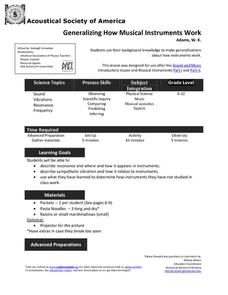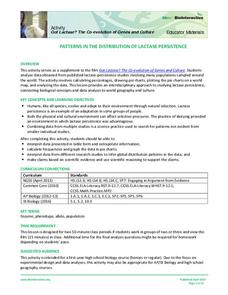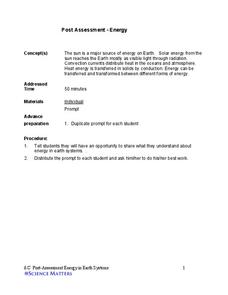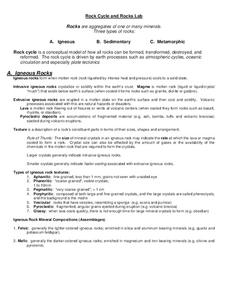Curated OER
Exploring Basic Physical Science Concepts
Young scholars use the concepts of simple machines to construct a mobile. The inquiry is made in groups and presentations are made by constructing reports. The assessment is based upon the final product of the mobile and how students use...
Curated OER
Sports and Science
Using footballs, basketballs, tennis balls, and more, learners conduct experiments to illustrate Newton's Laws of Motion. The experiments are conducted outside, and require them to throw, kick, and hit a variety of balls. Your class...
Acoustical Society of America
Generalizing How Musical Instruments Work
Sound, vibrations, resonance, and frequency are explored as learners use music to foster scientific inquiry. They engage in three different sound experiments and follow up discussions to foster a better understanding of how musical...
Teach Engineering
Chromatography Lab
Groups use alcohol and chromatography paper to separate the color components of black ink. The purpose of the activity is to allow the class to become aware that mixtures exist in hidden places.
Virginia Department of Education
Elements and Electron Configuration
It's electronic! Pupils uncover elements and their electron configurations as they explore mass, groupings, correct charges, and sliding theory. Young scientists learn creative ways to remember various elements and correctly classify...
CK-12 Foundation
Newton's Cannon
Gravity does more than keep our feet on the ground — it holds a satellite in orbit, too. Help learners understand the effects of gravity on an orbiting object through a simulation activity. Individuals adjust a launch speed and watch as...
Colorado State University
How Far Away Is Space?
Outer space may be a lot closer than you think! Science scholars model the layers of the atmosphere using transparencies to gain insight into the scale of space. The resource includes ideas to tailor the activity to the skill level of...
Howard Hughes Medical Institute
Patterns in the Distribution of Lactase Persistence
We all drink milk as babies, so why can't we all drink it as adults? Examine the trend in lactase production on the world-wide scale as science scholars analyze and interpret data. Groups create pie charts from the data, place them on a...
CK-12 Foundation
Butterfly Stroke
Swimmers improve their times by understanding the physics of their sport. As a swimmer moves through the water, the efficiency of motion affects the resulting velocity. Through an interactive simulation, pupils change the level of motion...
Virginia Department of Education
Building a DNA Model
It has been decades since the discovery of DNA. Still, activities such building this DNA model allow blossoming scientists to better understand the components that form this overall structure. During this activity, they will also...
Science Matters
Post-Assessment Energy
After nine lessons and activities about energy, here is the final assessment. The 20-questions include multiple choice, multiple choice with justification, short answer, answer analysis, and labeling diagrams to challenge learners.
Curated OER
Light and Geometric Optics
It's time to see the light with a unit that focuses on light and geometric optics, including concave and convex mirrors. A variety of experiments, worksheets, and online activities are included.
Institute of Electrical and Electronics Engineers
Solar Structures
It's time to soak up the sun! Youngsters read about active and passive solar heating systems, then they collaborate to create a miniature solar-heated building. Provide a variety of materials for them to incorporate and watch their...
University of New Orleans
Rock Cycle and Rocks Lab
Science rocks! Explore three types of rocks and the rock cycle with an igneous rocks experiment. Pupils discuss textures, composition, and learn how melts are formed from the Earth's crust. They weigh materials using a scientific scale...
Teach Engineering
Preconditioning Balloons: Viscoelastic Biomedical Experiments
What does stretching a balloon have to do with equilibrium? Groups explore preconditioning by stretching a balloon to a point of equilibrium. They then measure the amount of force required to stretch the balloon to the same point several...
Curated OER
Acceleration Lab
Young Einsteins experiment with the acceleration of Hot Wheels™ toy cars down inclined planes at various angles. This classic physics lab activity is thoroughly explained in both a teacher’s guide and a student lab sheet. Science...
Curated OER
Temperature and the Density of Air
Here is a hands-on activity in which junior scientists put air into a balloon to create a closed system. They measure its circumference, warm it in hot water, and then remeasure its circumference to discover how temperature affects the...
Curated OER
Integrating Physical Science and the Geological Environment
Students undertake a series of experiments and activities related to geology, especially in Connecticut. They evaluate types of rocks, minerals, and crystals, exploring the main concepts of geology.
Curated OER
Weather Analysis - Lab Activity
Ninth graders perform research in the subject of weather to answer several key questions to increase comprehension of concepts. Students use weather prediction as an application for the research.
Curated OER
What Wavelength Was That?
A combination of informative text, photos, and graphics comprise this sharp show on electromagnetic radiation. Some slides mention hands-on activities for demonstrating concepts, so if you want to include them you will need to figure out...
Curated OER
Physical Science: Magnets
Students investigate magnets and how they work. They read and discuss the book, What Makes a Magnet and record their observations as they complete activities. After exploring the magnet set, they record their predictions and results...
Curated OER
The Physics of Hummingbirds: Magic in the Air
Students study hummingbirds and how they use Newton's law. In this motion lesson students complete several activities and view videos of hummingbirds.
Curated OER
Ready, Set, Let's Dough! It's a Matter of System
Students explore physical sciences by participating in a class experiment. In this matter instructional activity, students identify the three forms of matter and their physical differences. Students utilize cookie dough to create a play...
University of Colorado
Modeling Sizes of Planets
The density of the huge planet of Saturn is 0.7 g/cm3, which means it could float in water! In the second part of 22, science pupils explore the size and order of the planets. They then calculate weight and/or gravity and density of...

























